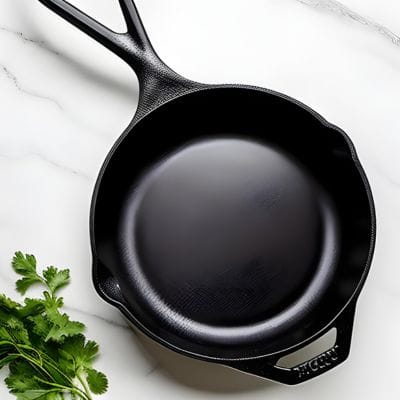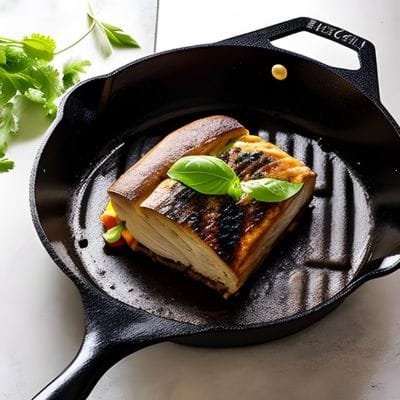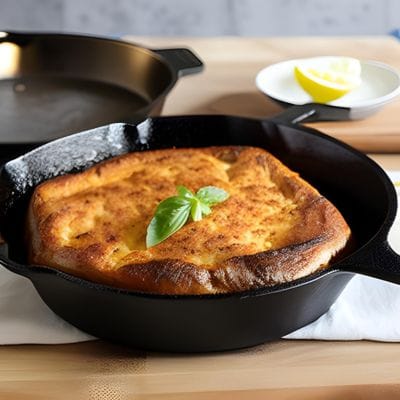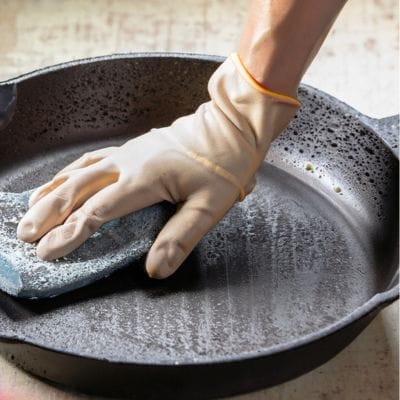People all over the world love cast iron cookware because it keeps heat in and cooks food evenly. But over time, even the best pan can get sticky, which can make you worry about Can You Cook with Sticky Cast Iron.
Today we’re going to discuss about why cast iron often gets sticky and whether it is still safe to use for cooking. We will also show you easy ways to fix your sticky skillet so that it can keep working well in the kitchen.

What is Sticky Cast Iron?
Cooking surfaces that aren’t smooth and don’t stick are called “sticky cast iron.” It feels rough instead of smooth, which makes it harder to cook because food sticks.
How Does Cast Iron Become Sticky?
Cast iron is well-known for its durability and non-stick properties when looked for properly. However, over time, it can lose its smooth surface and become sticky. Here are some usual reasons why this happens:

1. Seasoning Breakdown: The main cause of sticky cast iron is the breakdown of seasoning. Seasoning is a thin layer of polymerized oil that makes a non-stick barrier on the surface. With regular use, this layer can wear away, revealing the raw iron underneath.
2. High Heat Cooking: Cooking at very high temperatures can increase the breakdown of seasoning and excessive heat may cause the oil to degrade and turn slippery, resulting in a sticky surface.
3. Acidic Ingredients: Using highly acidic foods, like tomatoes or vinegar-based sauces, can damage the seasoning. These ingredients can mix with the iron, making it rough and sticky.
4. Metal tools: Using metal tools, especially sharp or abrasive ones, can scrape off the seasoned coating. This not only harms the non-stick surface but also opens the iron to rust and stickiness.
5. Improper Cleaning: Harsh cleaning methods—such as abrasive scouring pads or too much soap—can strip away the seasoning and add to stickiness.
6. Moisture Exposure: Leaving cast iron wet or in a humid environment can lead to rust, which may make the surface feel sticky if not handled properly.
Read More: Can You Use Pine-Sol on Granite Counters
Seasoning Your Cast Iron
Seasoning your cast iron cookware is important for creating a protective, non-stick layer that improves its cooking performance.
This process includes applying a thin layer of oil and heating it to high temperatures, allowing the oil to bond with the surface and form a natural coating.

Seasoning Your Cast Iron
Can I Cook with Sticky Cast Iron
Here’s an easy step-by-step guide to seasoning your cast iron:
1. Clean Your Cookware: Begin by washing your cast iron with warm, soapy water to clear dirt or residue. It’s okay to use soap; just be sure to rinse and dry it fully afterward.
2. Dry totally: After cleaning, make sure your cast iron is totally dry to prevent rust. You can use a towel or put it on the stove over low heat for a few minutes until it’s fully dry.
3. Apply a Thin Layer of Oil: Use a paper towel or cloth to spread a very thin layer of cooking oil over the entire surface of the cookware, including the handles and outside.
4. Remove Excess Oil: Wipe away any extra oil so that you have an even, thin layer. Too much oil can lead to sticking
5. Bake Your Cookware: Place your cast iron in an oven set to 375-400°F (190-204°C) and bake it for one hour. To catch any drips, place aluminum foil on the rack below.
6. Cool and Repeat: Let the cookware cool in the oven after baking. Repeat this process several times to build up a strong flavor layer. The more you use your cast iron, the better its seasoning will become!
Read More: Gran Perla Granite
Risks of Cooking with Sticky Cast Iron
Cooking with sticky cast iron is possible, but it comes with several drawbacks:
1. Food Quality: Sticky surfaces can lead to uneven cooking and increase the possibility of food sticking or burning, negatively impacting taste and texture.
2. Health Concerns: Rust spots or worn seasoning can infect food. While small amounts of rust are usually not harmful, it’s best to avoid consuming it.
3. Frustration and Inefficiency: Dealing with food that sticks can make cooking stressful and inefficient, detracting from the overall experience.
4. Maintenance Costs: Ignoring stickiness may result in more frequent re-seasoning or even demand replacing the cookware if damage becomes severe.
5. Reduced Longevity: Sticky cast iron is more vulnerable to rust, which can shorten its lifespan and regular maintenance helps protect your cookware for years to come.
Read More: Soapstone Countertops
How to Clean and Maintain Your Cast Iron
Maintaining your cast iron cookware is important for extending its life and ensuring optimal performance. Here’s a short guide on how to keep it clean and well-maintained:

Cleaning:
1. Quick Cleaning: Clean your cast iron while it’s still warm to make food residue removal easy and prevent stains from setting.
2. Gentle Scrubbing: Use a stiff brush or non-metal scrubber to gently remove food bits. Mild soap can be used if necessary, but rinse fully afterward.
3. Thorough Rinsing: Rinse with warm water to ensure all soap and food residue are removed, which helps keep the seasoning.
Drying:
1. Thorough Drying: Immediately dry your cast iron with a clean cloth. To ensure total dryness, place it on the stove over low heat for a few minutes.
Storage:
1. Proper Storage: Store in a dry, well-ventilated place. Avoid stacking multiple pieces together to avoid moisture buildup that can lead to rust.
Maintenance:
1. Re-seasoning: If the seasoning wears off or the surface becomes sticky, re-season by applying a thin layer of oil, wiping off extra, and baking upside down in an oven at 375-400°F (190-204°C) for one hour. Allow it to cool in the oven before keeping.
By following these steps you can keep your cast iron cookware in excellent shape for years!
Read More: Standard Countertop Height
FAQ
Yes, it’s safe to use sticky cast iron, but it may not give the best cooking results. It’s advisable to address the stickiness to improve your cooking experience.
Yes, you can use mild soap to clean your cast iron skillet. Just avoid abrasive scrubbers or strong chemicals that could damage the seasoning.
The frequency of seasoning varies on usage. Generally, it’s a good idea to season your cast iron after each use or whenever you notice a drop in its non-stick qualities.
Common oils for seasoning include vegetable oil, canola oil, and flaxseed oil. Choose an oil with a high smoke point for optimal effects.
Yes, you can use cast iron on a glass-top stove. However, be careful as cast iron is heavy and can scratch the glass surface. Handle it carefully and ensure the pan is clean and free of residue.









